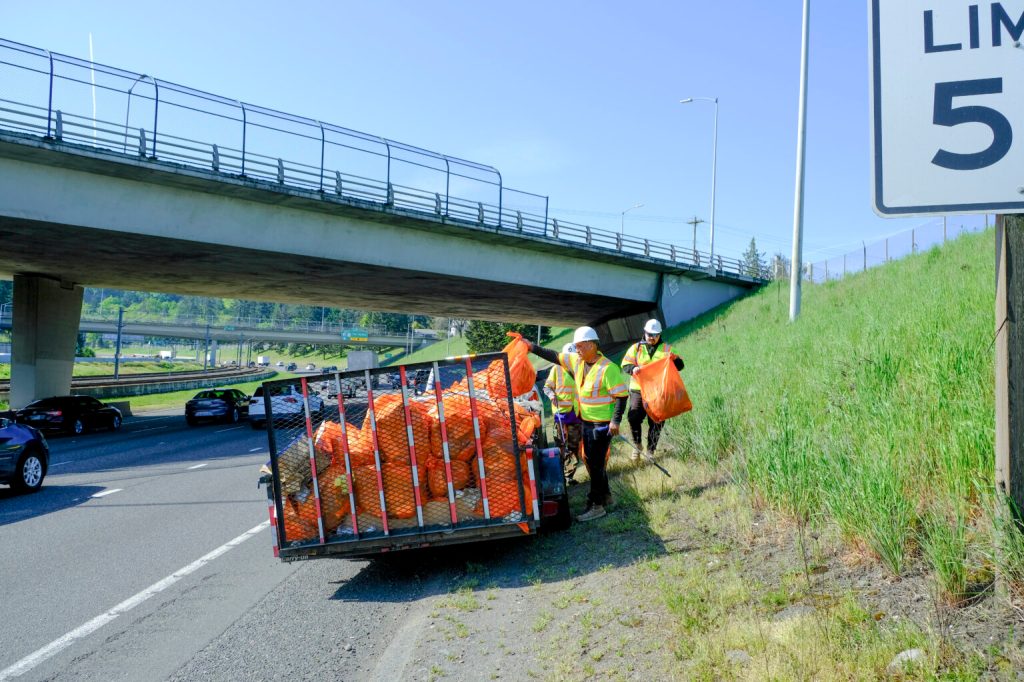Oregon lawmakers weigh increased oversight of state’s embattled transportation department
Published 7:41 am Wednesday, June 11, 2025

- A group of workers with Interstate Business Solutions — which contracts with the Oregon's Department of Transportation — clean up trash on a highway. Lawmakers are currently weighing a new transportation package that would enhance oversight for the department. (Courtesy of Interstate Business Solutions)
At a committee hearing Tuesday, legislators aiming to create a politically viable transportation package were met with calls for better oversight of the agency
A powerful committee tasked with creating the Legislature’s newest attempt at a transportation investment package faced growing calls Tuesday to hold Oregon’s imperiled Department of Transportation accountable for funding future projects and regulations aimed at restoring the state’s infrastructure.
Testimony from Oregonians on House Bill 2025, a 102-page piece of legislation that would institute dozens of taxes including a 15-cent raise to the gas tax and higher fees for electric vehicle drivers, lasted for about an hour and a half. It’s the latest in a series of proposals Oregon lawmakers have put forth this session to address longstanding concerns over issues like crumbling roads and weakened bridges throughout the state.
Many speakers pressed lawmakers to ensure that they consider vulnerable communities throughout the state and the growing effects of climate change while deciding funding for roads and bridges. Representatives for unions, construction workers, environmental advocacy groups and other transportation industry insiders all came out to push lawmakers to fund key projects involving highway expansions, corridors and equitable development.
Trending
But perhaps one of the most significant changes the legislation makes is further oversight over Oregon’s heavily scrutinized Department of Transportation. In recent years, the department has been the subject of independent reviews, internal audits and public scrutiny over stretched out project timelines and increasing budget estimates.
This year, the department is facing a budget deficit, and its workers are pushing for further funding. The bill calls for further audits into the Department of Transportation and establishes quarterly reporting requirements regarding the agency’s progress on reforms and projects. It also would set up a new committee to check in on the status of infrastructure projects.
“Our priority throughout this conversation has not changed. We want to respect valuable frontline jobs in communities throughout the state,” Courtney Graham, political director for the Service Employees International Union Local 503, which represents more than 70,000 public employees and caregivers, told lawmakers Tuesday. “Absent a solution this session, more than 1,000 positions at [the department] will be eliminated, including hundreds of our members.”
Graham said delays in project delivery “have harmed public trust.” She said House Bill 2025 could help alleviate those concerns, but warned that “past legislatures have made choices like prioritizing major capital projects over core maintenance.”
Other speakers on Tuesday said they would like to see further accountability from the department beyond what lawmakers have proposed so far.
The department’s challenges merit “bold changes,” said Kirsten Adams, director and counsel for policy and public affairs for the Wilsonville-based Associated General Contractors. The joint committee in May reviewed findings from an independent investigative firm that attributed the agency’s plight to dated financial software, surging costs, turnover, and “workflow bottlenecks.”
Trending
“We also appreciate the efforts to bring more accountability to ODOT,” Adams said during her testimony. “However, we think these provisions could have gone farther, particularly in light of the work done this session by the committee on accountability issues and significant feedback received there.”
Lawmakers on the committee did not engage with speakers or ask questions, but they will likely do so in a work session that has not been scheduled yet. There are two more public hearings on the legislation: one on Wednesday regarding transit, rail and bike safety alongside public transit, and another on Thursday involving operations, maintenance and preservation.
The bill would also give Gov. Tina Kotek the authority to choose the director of the department in consultation with the Oregon Transportation Commission, a move Kotek supports. The governor currently appoints five commissioners from different areas of the state who must be confirmed by the Senate. The bill would extend the Senate’s mandate to also include a vote on the governor’s choice for director.
“At this point I’m not looking at any changes in the agency,” Kotek told reporters Monday. “But everything that I can have for stronger tools to hold that agency accountable will help me do my job and serve Oregonians better.”
The bill’s cost has been a point of contention and uncertainty among lawmakers, raising questions for several in attendance Tuesday who said they were unable to comment in further detail without more official analysis about the bill’s fiscal impact. At a Monday informational hearing, two lawmakers on the joint committee – Sen. Bruce Starr, R-Dundee, and Sen. Chris Gorsek, D-Troutdale – agreed the cost to taxpayers would likely generate at least $1 billion in revenue.







